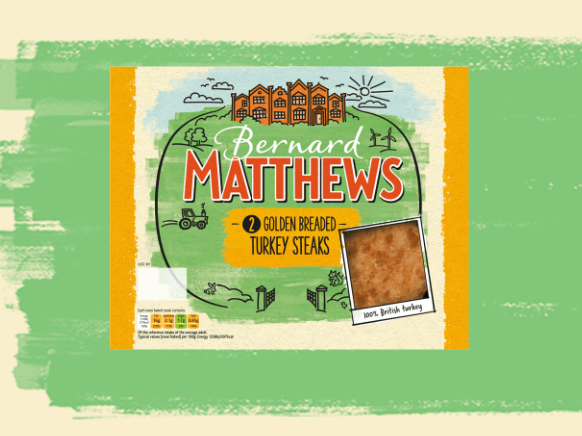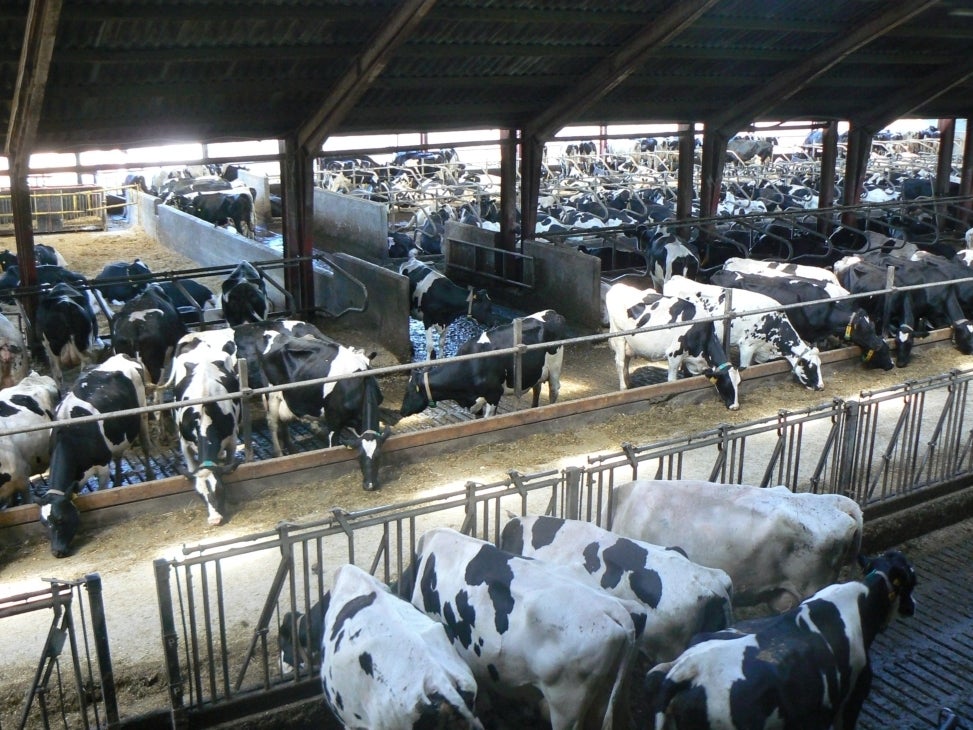Dairylea and Bernard Matthews among foods ‘potentially misleading shoppers’ with happy-animal labels
Exclusive: New campaign planned for law to force meat and dairy food firms to state whether animals were kept in cruel conditions

Food brands Dairylea and Bernard Matthews have been accused of potentially misleading shoppers with labelling that suggests the animals used spent their lives outdoors.
The makers of the processed cheese and turkey products are among many companies said to be giving shoppers an impression of high animal-welfare standards with pictures of fields or happy cows, or by using terms such as “grass-fed”, “farm fresh”, “butcher’s choice” and “all natural”, but in reality, it is not always clear what conditions their animals are kept in.
Opponents of factory farming made the claims as they prepared to launch a campaign for a new law forcing food companies to label all meat and dairy products with the method of production.
Experts believe that of all the animals raised in the UK each year for food, more than 70 per cent are factory-farmed – raised behind closed shed doors and out of public view.
Campaigning charity Compassion in World Farming highlighted how Dairylea triangles and strings depict cows on the box in green fields with blue skies.
And it said Bernard Matthews turkey pieces, slices and steaks all come in packaging suggesting the outdoors, with a tractor or gates to a field.
Yet growing numbers of dairy cows in Britain are kept indoors, and an estimated nine in 10 of the 18 million turkeys in Britain are reared entirely indoors with no freedom to run around in fresh air and daylight.
The group also highlighted other examples, such as the packaging on certain brands of sausages that show fields and trees.
There is nothing in law to oblige supermarkets or food firms to show on meat and dairy labels how the animals were reared, and definitions of terms such as “grass-fed” vary between products.
Campaigners said it means that shoppers are buying intensively farmed meat and dairy products without realising it – and many would choose to buy higher welfare items if given the full picture.
What the logos mean
- Red Tractor, the food industry’s scheme, allows cows to be kept indoors all year and sows to be confined during farrowing (giving birth) in crates where they cannot move around
- The Free Range Dairy Network requires cows to be grazed for at least six months a year
- Soil Association logo means organic and higher standards, a ban on indoor confinement, ensuring bedding and/or environmental enrichment and free-range access with shade and shelter
Sean Gifford, from Compassion in World Farming, said it would be almost impossible to distinguish low- and high-welfare from the packaging on two products sitting side by side.
He told The Independent: “There’s a sea of misleading labels out there keeping consumers in the dark through their wording, pictures of bucolic scenes and suggestions. But in reality animals are kept indoors in intensive systems: cows never feel grass under their feet and chickens never fly.
“On Dairylea, for instance, there’s no indication of the conditions the cows are kept in. But we know a growing percentage are kept indoors in Britain and never experience sunlight on their backs or grass under their feet. Bernard Matthews labels show the countryside with green grass but the reality of life for their turkeys is probably anything but outdoors. We suspect they are raised intensively because the company doesn't participate in any assurance schemes.
Proposed labelling
Campaigners' suggest a six-tier system
0 Intensive indoors
1 Improved indoors
2 Partially outdoors
3 Free range
4 Organic
5 Pasture-fed
He added: “If consumers could see behind closed doors they’d be shocked. If a pig is kept intensively all its life – with mother sows unable to even turn around to interact with her young – shoppers should be told. The brands we've highlighted are just the tip of the iceberg - there are many out there with misleading labels."
CiWF is about to launch a petition calling on the government to make it compulsory for food firms to state the method of production on labels.
“Labels on intensively reared products frequently display misleading images of rolling landscapes and happy animals, when in reality the livestock are crammed into barren cages, kept indoors all their lives or kept in such close confinement that they are unable to express their natural behaviours,” Bronwen Reinhardt, honest labelling campaign manager at CiWF.
Misleading slogans and images undermine farmers who genuinely operate to high welfare standards, she said.
Earlier this year the environment department (Defra) ran a public consultation on the future of food and farming after Brexit, with a document that said: “It is not always clear to the consumer what standards underpin welfare terminology; and definitions on labels, such as ‘grass-fed’, can vary between retailers. We are considering whether providing greater clarity of information to consumers could support higher welfare production.”
The consultation submissions are still being considered.
In a speech in January, environment secretary Michael Gove said: “I want us, outside the European Union, to develop new approaches to food labelling… there’s still no single, scaled, measure of how a farmer or food producer performs against a sensible basket of indicators, taking into account such things as soil health, control of pollution, contribution to water quality as well as animal welfare.
“We’ve been in discussion with farmers and food producers about how we might advance such a scheme and I think that, outside the EU, we could establish a measure of farm and food quality which would be world-leading.”
More appropriate slogans would be ‘raised in confinement’ or ‘grown quickly without access to the outdoors’
Mr Gifford said what’s needed is a system similar to that introduced for eggs in 2004 that made production method labelling compulsory, after which free-range and organic egg sales “went through the roof”.
Mandatory production and slaughter method labelling was one policy Labour promised in its 50-point animal-welfare plan published in February.
As milk prices have fallen in recent years, under-pressure farmers have moved towards more intensive systems, building vast sheds packed with dairy cows who are fed not on grass but on protein-heavy diets to boost milk production.
Research by World Animal Protection has found Britain now has about 100 industrial “mega-farms”, each housing up to 3,000 cows that are kept permanently indoors.

Many farms keep cattle indoors some of the time and allow them outdoors at other times.
But some have estimated that all “zero-grazing” systems – accused of causing painful lameness and mastitis because cows stand on concrete floors for prolonged periods – are in place in one in five British dairy farms.
According to Labelling Matters, a coalition of groups lobbying since 2011 for a law on production method labelling, such a step would benefit not just shoppers and farm animals but farmers too, creating a level playing field for them.
A spokeswoman for Mondelez, which owns the Dairylea brand, said: “The farmers that supply to us graze their cows whenever weather conditions and location allows, and wherever this is appropriate and manageable from their perspective. Therefore, it is not practical or possible for us to guarantee that 100 per cent of the cows providing our milk can graze 100 per cent of the time.
“Ensuring that suppliers take good care of their herds is fundamental to ensuring our cheeses are made with high-quality milk. The environment in which the cows are kept is a key part of that and protecting them from physical and thermal discomfort, fear and distress is a priority for our suppliers.”
The Independent has asked the Two Sisters Food Group, owner of the Bernard Matthews brand, for a comment but had not received one at the time of publication.
Join our commenting forum
Join thought-provoking conversations, follow other Independent readers and see their replies
Comments
Bookmark popover
Removed from bookmarks